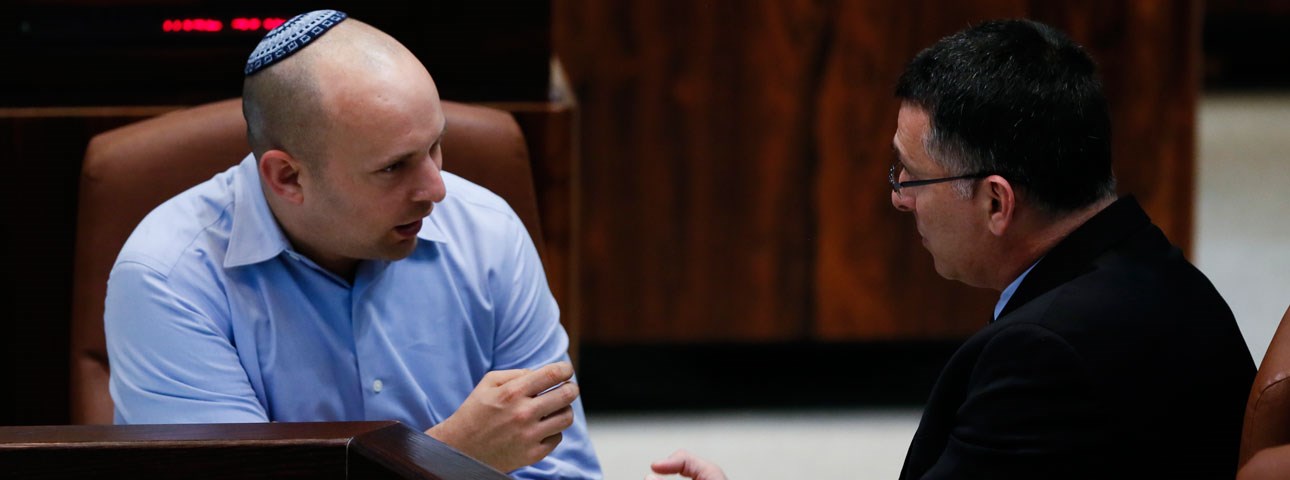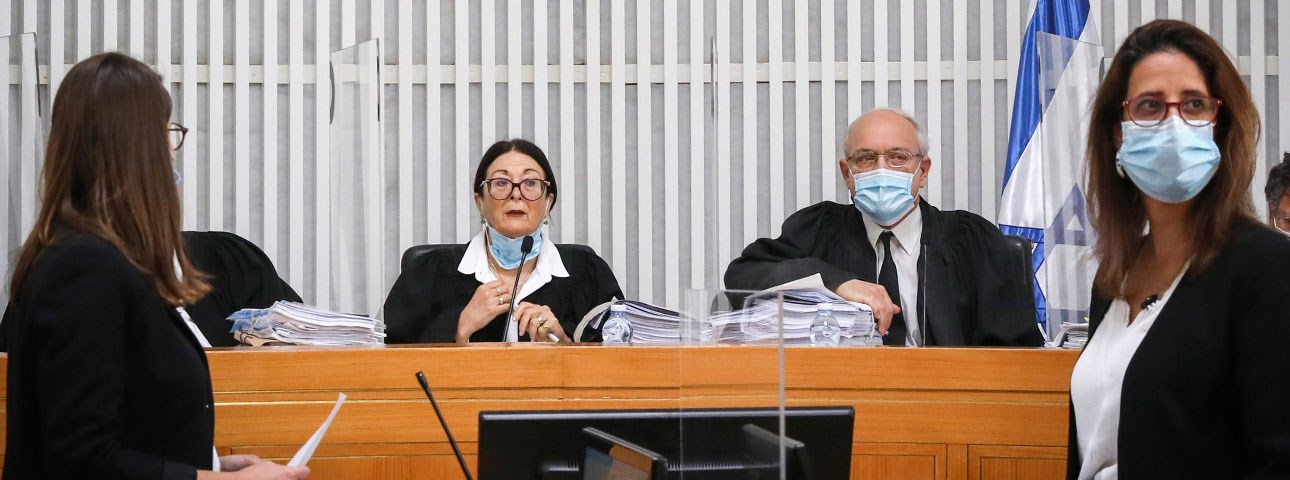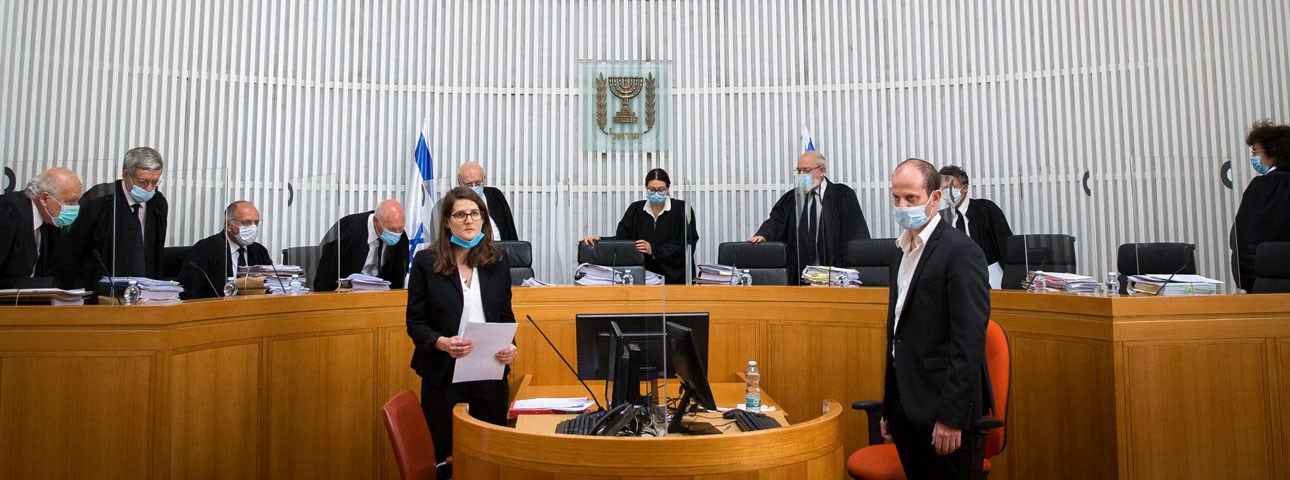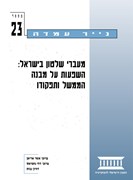

Publications Regarding Prime Minister
Articles

How a once-cautious Benjamin Netanyahu came to lead the most radical coalition in Israel’s history
Written By: Prof. Ofer Kenig
How can Netanyahu — a U.S.-educated and respected world leader who was cautious in his approach to building previous coalitions, and was once respectful of Israeli democratic institutions — support such a dangerous plan? Was the “writing on the wall” earlier on in his lengthy tenure?

What is “Incapacity” and what are the Implications of a Prime Minister’s Incapacity?
Written By: Dr. Amir Fuchs
When is the Attorney General empowered to declare that the Prime Minister is incapable of fulfilling his duties? When does temporary incapacity become permanent? What has the Court ruled in the past about a declaration of incapacity concerning Benjamin Netanyahu?

The Incapacitation of a Prime Minister: An Explainer
Written By: Dr. Amir Fuchs
What provisions does Israeli law provide for the possibility of declaring the Prime Minister "Incapacitated". IDI expert explains

Q&A: Plea Bargain Agreements
Written By: Dr. Amir Fuchs, Dr. Guy Lurie
As former Prime Minister Netanyahu weighs the option of a plea bargain, IDI experts weigh in on the legal standing of such an agreement and its ramifications.

A Cooling-Off Period for a Prime Minister and Breakaway Knesset Factions: Qs and As
Written By: Dr. Amir Fuchs, Dr. Assaf Shapira
There are no provisions for limiting the tenure of prime ministers in parliamentary democracies such as Israel, and any new rules must be objective and not made to satisfy political needs

The Return of Direct Elections for Prime Minister?
Written By: Dr. Assaf Shapira, Dr. Amir Fuchs
Prime Minister Netanyahu is promoting legislation that that will institute direct elections for prime minister. How would this proposal work? Will it resolve the political stalemate? Would the Supreme Court rule on its legality? IDI experts weigh in.

A Minority Government? A Prime Minister from a Small or Medium-Sized Party? You’d Be Surprised…
Written By: Prof. Ofer Kenig
Prof. Ofer Kenig presents examples of parliamentary democracies in which the Prime Minister is from a small party.

A Prime Minister on Trial: Qs and As
Written By: Dr. Amir Fuchs
The Prime Minister's trial reconvenes with a pandemic raging and the elections camping continuing. What can we expect?

Only 25% of Israelis Approve of Netanyahu's Handling of the Corona Crisis
Written By: Prof. Tamar Hermann, Dr. Or Anabi
The Israeli Voice Index for July 2020 found that 58% of Israelis identify with the protests against the government’s economic policies while 45% identify with the elements focused on personal opposition to Prime Minister Netanyahu

No More Shame - No More Responsibility
Written By: Prof. Yedidia Z. Stern
Now more than ever Israel needs a leader who will bolster its inner strength - is the leadership up to the task?

Half of Israelis Favor Applying Sovereignty
Written By: Prof. Tamar Hermann, Dr. Or Anabi
The Israeli Voice Index for May 2020 found that 50% of the public supports applying Israeli sovereignty over parts of the West Bank (Judea and Samaria) with the U.S. administration’s support (25%) and without American backing (25%)

IDI's Legal Experts Hold Online Briefing Ahead of Netanyahu's Trial
Written By: Prof. Yuval Shany, Dr. Amir Fuchs
With Prime Minister Netanyahu's groundbreaking trial is set to commence next week, Professor Yuval Shany, IDI's Vice President of Research, and Dr. Amir Fuchs, the head of the Defending Democratic Values Program, briefed journalists on how the court process will proceed and the long-term legal implications of trying a sitting prime minister.

Live Broadcasts from the Supreme Court
Written By: Yair Sheleg
Live broadcasts brings a breath of fresh air and a better understanding of the Supreme Court

Bibi is Given the "Go Ahead" by Supreme Court
Written By: Dr. Amir Fuchs
IDI’s Dr. Amir Fuchs speaks with Richard Pater of Bicom about the recent Supreme Court hearing and the rulings they handed downs regarding the new government

PM Under Indictment - A Dangerous Precedent
Allowing Netanyahu to form a government would constitute a conflict of interest and would result in a negative and irreversible precedent for the rule of law

Prime Minister Netanyahu - 11 Consecutive Years
Written By: Prof. Ofer Kenig

Prime Minister on Trial - Explainer
Written By: Dr. Amir Fuchs
Prime Minister Netanyahu’s trial in the Jerusalem District Court is to begin on March 17th. Dr. Amir Fuchs, a researcher at the Israel Democracy Institute provides responses to key questions as to what this process will look like.

Immunity for the Prime Minister: Explainer
Written By: Prof. Yuval Shany, Dr. Amir Fuchs
IDI experts explain Israel’s immunity law, what happens when it’s requested and what the implications may be for the political system.

A Legal or Political Matter?
The political system is being dragged into elections for the third time within a year, for what seem to be extraneous reasons related to the question of how Netanyahu will handle his cases

Israeli Voters - Not Judges
Written By: Prof. Yedidia Z. Stern
Israeli Voters, Not Judges, Must Determine Who Will Lead the Country Next

Overwhelming Support for Retaining Judicial Review Among Right Wing-Voters
A special IDI survey examined attitudes of right wing voters and found that 42% of right-wing voters support a unity government and that 43% oppose additional political power for elected officials at the expense of the Judicial Branch of government.

The Positions of the Israeli Right-Wing
Written By: Prof. Tamar Hermann, Dr. Or Anabi
This special survey examines attitudes of right wing voters on a number of issues related to September's election including the possibility of a unity government and recent proposals that would limit judicial review and oversight of Knesset and government decisions.

BB > BG
Written By: Prof. Ofer Kenig
On July 19th 2019, Netanyahu’s total days in office as Israel’s prime minister equals Ben-Gurion’s and on July 20th he will hold the title of the Israeli prime minister with the longest term in office. This also will make him the third most 'veteran' leader among the OECD countries.

Does Benjamin Netanyahu Face Real Competition?
Written By: Prof. Tamar Hermann, Prof. Efraim Yaar
The monthly Peace Index reveals that: 46% of Jewish Israelis name Benjamin Netanyahu as their preferred candidate for the next prime minister.

The Assault on the Rule of Law
Written By: Prof. Yedidia Z. Stern
Powerful forces are pushing against the rule of law, attempting to derail it. From the perspective of those who wish to preserve the rule of law, we are living in a Greek tragedy whose dreadful outcome is foreknown.

The Prime Minister’s Digital Literacy
Written By: Dr. Tehilla Shwartz Altshuler
When a sizable portion of our decision-makers have that difficulty, and “digital illiteracy” becomes evident in the upper echelons where decisions are made, we’ve got a problem. This article was first published by The Jerusalem Post.

Netanyahu’s East Africa Visit: Negotiating Away Israel’s ‘Unwanted’ Asylum-Seekers
Written By: Dr. Ruvi Ziegler
Earlier this month, Prime Minister Benjamin Netanyahu concluded a visit to East Africa. Uganda is doubly symbolic in collective Jewish-Israeli memory. In 1903, the ‘Uganda proposal’ put the territory forward as a supposedly alternative site for Jewish self-determination; the Zionist Congress rejected it. And Uganda was also the site of the Entebbe raid on 3-4 July 1976, when an Israeli commando squad rescued 103 civilians being held hostage after a plane was hijacked en route from Israel to France.

Time to Allow Everyone to Worship at the Foot of the Temple Mount as they Wish
Written By: Prof. Yedidia Z. Stern
No aspect of the current Western Wall plaza arrangement, in which the Orthodox maintain a monopoly, will change if other denominations are allowed to pray at the foot of the Temple Mount in a new plaza. This article was first published by The Jerusalem Post.

Israel Should Recognize Judaism's Main Denominations
Written By: Yohanan Plesner
IDI President Yohanan Plesner writes that Reform, Conservative, Orthodox, Reconstructionist and secular Jews are all members of the Jewish people. The Israeli government must grant equal recognition to the central movements within Judaism, including equal funding for all.

23 Knesset Seats is Not a Victory
Written By: Yehoshua Oz
In an op-ed in the Jerusalem Post, Yehoshua Oz, IDI's Director of International Communications, argues that pundits eager to crown a victor in the 2015 elections have lost sight of the fact that winning one-fifth of the Knesset seats is no victory.

The Firing of Ministers in Israel: A Historical Overview
Written By: Prof. Ofer Kenig
The demise of the 19th Knesset was hastened by Prime Minister Benjamin Netanyahu's firing of Finance Minister Yair Lapid and Justice Minister Tzipi Livni. In the article below, IDI researcher Dr. Ofer Kenig discusses the various grounds for firing ministers in the past and how the current case fits into Israeli political practice.

Confronting the Rabin Assassination
Written By: Prof. Mordechai Kremnitzer
Nineteen years after the murder of Prime Minister Yitzhak Rabin, IDI Vice President Prof. Mordechai Kremnitzer explores the background, meaning, and ramifications of this event, taking a hard look at some of the dangers he sees in Israeli society today.

Abolish the Presidency? Certainly Not This Way
Written By: Prof. Ofer Kenig
Dr. Ofer Kenig responds to the initiative to abolish the presidency and emphasizes that such decisions require due consideration and cannot be taken as part of a capricious move that tramples on the democratic rules of the game.

Remembering Ariel Sharon (1928–2014)
Written By: Prof. Ofer Kenig
Dr. Ofer Kenig presents some of the milestones in the career of Ariel Sharon, the 11th Prime Minister of the State of Israel.

Between Shamir and Ben-Gurion
Written By: Prof. Ofer Kenig
On November 10, 2012, Prime Minister Benjamin Netanyahu became the Israeli prime minister who has served the second longest cumulative term. Dr. Ofer Kenig explores Netanyahu's placement between record-holder David Ben-Gurion and Yitzhak Shamir.

IDI President Dr. Arye Carmon on the Ehud Olmert Verdict
Written By: Dr. Arye Carmon
In this video interview, IDI Former President and Founder Dr. Arye Carmon responds to Former Prime Minister Ehud Olmert's acquittal of most of the charges against him in July 2012.

The Netanyahu Government: In Praise of Stability?
Written By: Prof. Ofer Kenig
The second Netanyahu government, which recently marked three years in office, is Israel's most stable government in 25 years. But is stability a good thing? IDI Researcher Dr. Ofer Kenig shares his thoughts on this matter.

And the Winner is...
According to Israel's Basic Law, following general elections the president appoints a Knesset Member to form the new government. In the wake of the 2009 Israeli general election, Benjamin Netanyahu was chosen – even though he did not lead the largest party. Dr. Dana Blander proposes the establishment of a clear set of rules which would automatically give the leader of the largest party the power to form the incoming government, obviating ambiguity surrounding the selection process of the Prime Minister.

Who's Afraid of a Jewish State with Equality for All?
Written By: Yohanan Plesner
A state that is proud of its identity has nothing to fear from granting all its citizens equality.

Peace Index: 40% of Israelis Believe that Rifts Between Groups Will Widen
Monthly survey also finds that 84.5% of Israeli public defines mood as good or very good while 43% expresses trust in Prime Minister Netanyahu.

Israelis: Trump Will Allow Construction in the Territories
Latest Peace Index shows majority of Jewish Israelis think Netanyahu’s performance is not very good.


